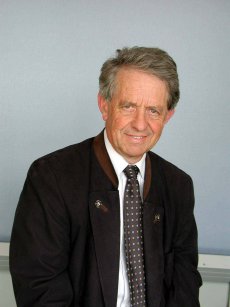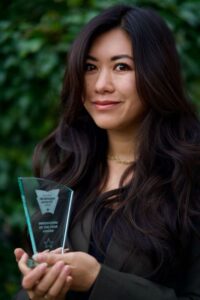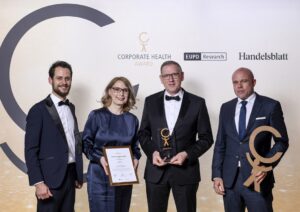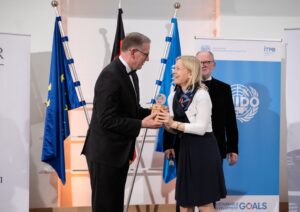Visionary German Wins 2003 Stockholm Water Prize
The German Professor Peter A. Wilderer, who has promoted and developed holistic, interdisciplinary research for more than 30 years in the pursuit of sustainable water use and sanitation, was announced as the 2003 Stockholm Water Prize Laureate.

Professor Peter A. Wilderer
Professor Wilderer's research is marked by a rare combination of detailed technology development and a deep concern for the environment and human quality of life.
Peter A. Wilderer is a Professor at the Technical University of Munich and serves also as Director of the Institute of Advanced Studies on Sustainability (IoS).
In a news conference at the Stockholm City Hall, Professor Anders Stigebrandt, chairman of the international Nominating Committee, read the motivation.
"Professor Peter A. Wilderer is awarded the Stockholm Water Prize for the development and demonstration of integrative approaches to water and wastewater management across the spectrum of fundamental research, applied research, technology implementation and sustainable water management."
Professor Wilderer, 64, will receive the Prize from His Majesty King Carl XVI Gustaf of Sweden at a ceremony in the Stockholm City Hall on Thursday, August 14, during the annual World Water Week in Stockholm. The Laureate receives USD 150,000 and a crystal sculpture.
An Integrated Holistic Vision of Water Management
In the long term, water management can only be successful if the interrelationships between environmental factors, ecological and microbiological systems and human activities are understood in detail. Based on this and a repeatedly shown ability to define scientific problems across disciplinary borders, Professor Wilderer has developed and demonstrated a profoundly holistic vision of sustainable and integrated water and wastewater management.
Professor Wilderer, who was educated as a civil engineer, realised already in the early 1970s -- unusual for the time -- of the need to understand various ways humans affect the water cycle. By bringing scientists of different disciplines together to solve problems, and by communicating with the public, industry, business and public institutions, he has demonstrated that decision making might be based on sound science and appropriate technology and result in sustainable water management.
His recent initiation of the international program "Safe Blue Danube" on water-related risk management is one such example. The aim is to develop appropriate measures to detect, avoid and counteract disastrous events concerning flooding and accidental pollution in the Danube river, its tributaries and delta in the Black Sea.
Concrete Contributions, Realistic Approaches
The hallmarks of Professor Wilderer's research are a rare combination of detailed technology development and a deep concern for the environment and human quality of life. His contributions to basic discoveries now applied in modern biofilm reactors enable treatment facilities world-wide to clean waste-water from homes, business and industries, and return it safely every day for reuse in the water cycle.
He was one of the first researchers, however, to question the sustainability of transferring Western sanitary concepts, with their traditional emphasis on centralised, large-scale solutions used in big cities, to the rest of the world. He thus recognised and promoted early the importance of decentralised, cost-effective small-scale wastewater treatment and reuse of water, important since 95% of the urban population growth by 2025 will take place in rapidly growing cities in poor developing countries.
The Stockholm Water Prize
The Stockholm Water Prize is an international environmental award presented by the Stockholm Water Foundation annually in honor of outstanding achievements in science, engineering, technology, education or public policy related to protection of the world´s water resources. The Prize is awarded to an institution, organization, individual or company that has contributed substantially to water preservation and enhancement through applied research or direct action. It recognizes efforts that increase knowledge of, and win respect for, the water environment. The Stockholm Water Prize, which was first awarded in 1991, is valued at USD 150,000.
Stockholm Water Prize Laureates have represented many water-related activities and scientific disciplines and have come from Australia, Canada, Denmark, Great Britain, India, Israel, Japan, South Africa, Switzerland, the United States and Venezuela. By stimulating discussion and honoring excellence, the Prize contributes to protection and enhancement of the world´s water environment.
Founders of the Stockholm Water Prize are the companies Anglian Water, Bacardi, Compaq, DuPont, Fujitsu Siemens Computers, General Motors, Grundfos, ITT Flygt, J P Nordiska, Kemira Kemwater, KPMG, Ragn-Sells, SAS, Swedish Railways (SJ), Snecma, Stockholm Water Festival, Uponor Group and Water Environment Federation (WEF).
HM King Carl XVI Gustaf of Sweden is the Patron of the Stockholm Water Prize. The Stockholm Water Prize, a beautiful Orrefors crystal and silver sculpture designed by the internationally renowned Swedish artist Gunnar Cyrén, is presented annually to the Prize Laureate. Forged in silver atop the sculpture, which weighs more than 30 kilograms, is the silhouette of "Gamla Stan," Stockholm´s Old Town, as seen through the artist´s eyes.







